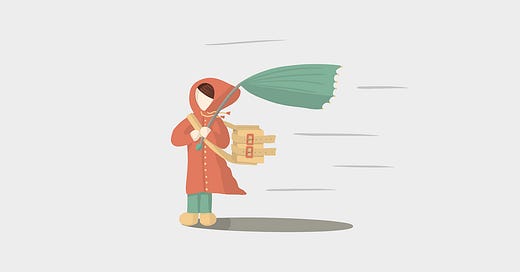I don’t know about you, but I’m basically a human barometer. I can tell what the weather is going to be like before I even open my curtains. Too hot, too cold, too wet, too windy…my body has something to say about it. It’s like I’m the Goldilocks of humans, constantly waiting for the weather to be justtttt right.
This Sunday was a perfect example. I felt like there was a vice over my head. Everything felt fuzzy. I could feel my bones aching, pulsating. My neck hurt so much it made me feel physically sick. The afternoon went by in a blur of falling in and out of sleep, flat on my face in the dark, unable to do anything.
And I’m pretty sure it was because the weather was absolute crap.
Whenever this happens, I text my friend Louise Bellamy. Louise studied Meteorology (weather) and climate at university, and she now works as a climate scientist. She has Hypermobile Ehlers Danlos Syndrome (hEDS), as well as some autoimmune conditions - meaning that she lives with chronic pain and fatigue.
“I noticed certain weather conditions seemed to impact my symptoms more, and found some scientific papers that made note of this connection,” she told me.
Our chat history is littered with discussions about the weather of the day and how it probably explains how we’re feeling.
Granted, sometimes it can be difficult to separate out why certain symptoms are playing up, but I’m as positive as positive can be that weather plays a role in exacerbating some symptoms, some of the time.
I asked people on Instagram to share their experiences of how the weather impacts their chronic illness, and I received a whole host of replies ranging from air pressure causing migraines and dizziness, achy-ness in the damp (gotta love living in London), worsening pain in the cold, and heat causing an exacerbation of PoTS symptoms, among many others.
But why is this the case? I asked Louise to try and understand the role of weather on our symptoms.
What are some of the most common ways the weather impacts people with chronic conditions?
Anecdotally we’ve all heard someone say they can feel a storm coming in their knees, head, back etc. Julie Walters' character in Paddington even claims this!
Different conditions and symptoms can all be triggered by different weather, and it can be a bit complicated for researchers to study this as there are so many variables that affect our symptoms, and everyone’s body is different.
Some may find their asthma is worse when it’s cold or damp, whereas others may find no effect.
As those of us with chronic conditions know, there can be many things that trigger flare ups; lack of sleep, how much we’ve done, hormones, even what we’ve eaten, and in reality weather is just one component when it’s a combination of things that can cause our symptoms.
Even non-chronically ill people can be affected by the weather too, extremes of temperatures don’t make anyone feel particularly great, and humidity can prevent us from cooling down in hot weather.
How does the weather affect you? I'm asking you these questions on Sunday night, after both of us experienced really severe nausea, migraines and neck pain that was probably exacerbated by the weather!?
It almost certainly was! My joint and muscle pain is significantly worse when it is damp/humid, and when the air pressure is ‘low’.
A lot of people find winter months are worse for chronic pain, and often attribute this to the colder temperatures. This is a bit misleading as the cold only really causes pain when you get cold, it is more the fact that (in the UK) it is rainier with lots of low pressure systems in autumn and winter.
You can be cosy in your home on a stormy day and still feel pain because of the air pressure and humidity, in the same way that a really humid summer or a summer storm can trigger pain despite the temperatures being warm.
I think the strangest symptom I get is that I quite often lose my voice when it rains, possibly because our voice box has joints that can swell.
In general my migraines are worse when the air pressure is high, and research suggests this isn’t uncommon, however if there is a rapid change in air pressure or if cold/damp weather makes your neck muscles tense you can still get migraines with low air pressure - as was the case on Sunday.
I’ve also noticed that my PoTS is worse when the air pressure is high, but that tends to only be if it is extremely high, and as those of us with PoTS know there are many many other factors that can make our symptoms worse.
I’ve often noticed when the weather is “bad” I see on socials that a lot more of my chronically ill pals are in pain, often with them wondering why as they’ve done everything “right”, not overdone it etc, and when I mention it could be the weather I generally get responses along the lines of “ohh that makes so much sense! I feel better knowing that’s why”.
Honestly, it ALWAYS makes me feel better to understand that! But why does this happen?
To continue reading this post, you can become a premium subscriber to The Rest Room by clicking the button below.
Keep reading with a 7-day free trial
Subscribe to The Rest Room to keep reading this post and get 7 days of free access to the full post archives.





